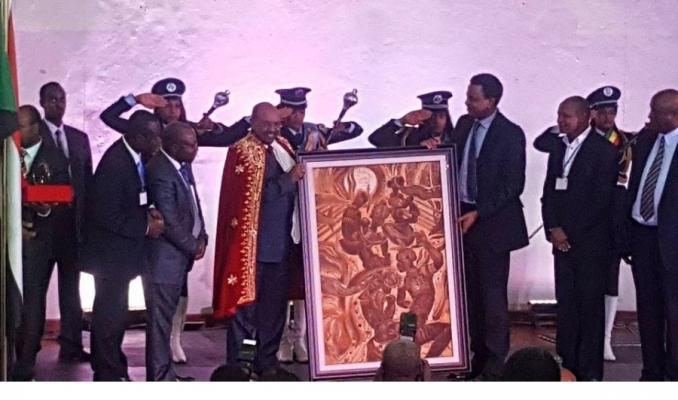Sudan’s Bashir says non-cooperation with ICC an attempt to “balance scales of justice”

July 29, 2016 (KHARTOUM) – Sudanese President Omer al-Bashir on Friday said he didn’t breach or rebel against the international order but wanted to “make the scales of justice balanced and achieve equality”.
Al-Bashir was alluding to his refusal to cooperate with the International Criminal Court (ICC) which issued two arrest warrants against him in 2009 and 2010 for alleged war crimes, crimes against humanity and genocide committed in Darfur.
On Friday, al-Bashir received African Dignity Award at Nelson Mandela Hall in Addis Ababa University by the first African Dignity Forum “for being a symbol of resistance, strong leadership and his commitment for African institutions,” according to the Ethiopian News Agency
Al-Bashir, who addressed the closing session of the Forum in the presence of the Ethiopia’s minister of interior, called on all African leaders to take practical steps to show respect and appreciation for the African justice mechanisms and spread good governance that is based on freedom, democracy and accountability.
He said this “is an expression of respect and honour for all the African nations and for the glorious men and women who struggled for liberty and dignity of the continent.”
“The honour put a responsibility upon me and my colleague the leaders of African countries to step up our struggle against discrimination and injustice”, he further stressed.
He also demanded the African leaders to sign and ratify all treaties and conventions issued by the African Union to enhance human rights and support the work of institutions seeking to preserve dignity of the African people.
The Sudanese President underscored importance of the forum, saying “our sacrifice to restore the African dignity is not a rebellion against the international order” but an attempt to balance the scale of justice and achieve equality.
“I am aware that you are honouring the Sudanese people who refused and resisted injustice, tyranny and colonialism in its old and modern forms,” he said.
The forum was launched by the Addis Ababa University on Tuesday 25 and ended on 29 July. The initiative aims at basing Africans development efforts on Africans Indigenous Knowledge systems.
It was launched in partnership with the United Nations University for Peace (UP-EACE), the Islamic Educational Scientific and Cultural Organization (ISESCO), Chair of Cultural Diversity based at the International Relations Institute in Cameroon, the Institute for Peace and Conflict Studies African Network,Tanzania and Centre for the Study of Peace and Human Rights in Sudan.
A-Bashir is the first sitting head of state charged by the Hague based court since its inception in 2002.
The Sudanese government says the court has no jurisdiction over Sudan, accusing it of becoming a political tool to target African leaders.
Al-Bashir has continued to travel freely around parts of Africa and Asia, riding a swell of defiance vis-à-vis the ICC among some leaders.
(ST)
